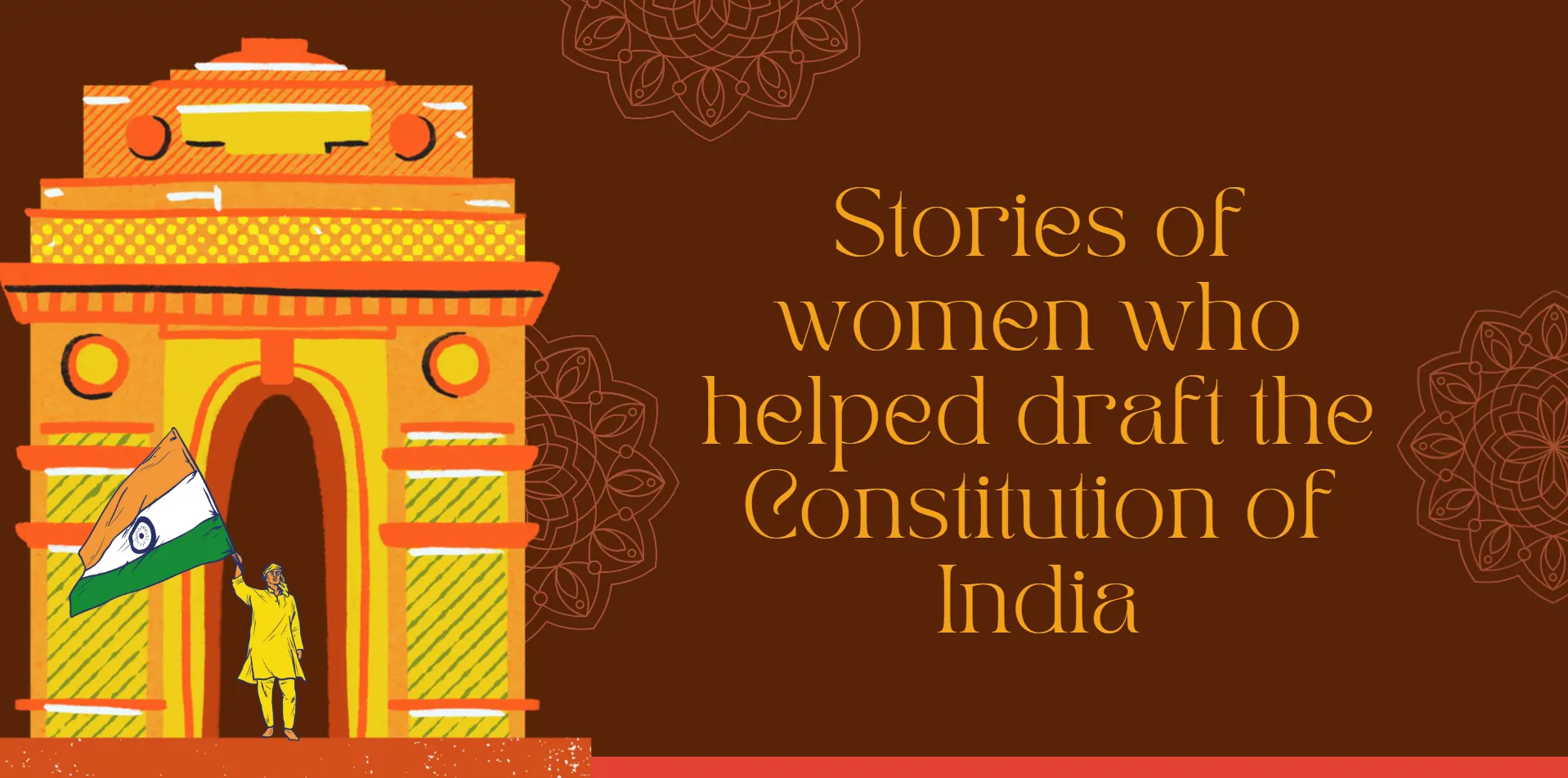
The Constitution of India was framed long back and was a great task behind the building the world’s largest democracy. On one hand, many marvellous activities performed by leaders such as Dr. B.R. Ambedkar are documented, but on the other hand the crucial activities of women in this regard are often unnoticed. These early women leaders came with a view of change and lobbying for a change of policies so that the constitution could acknowledge and accommodate the rest of the Indian population. It is here that we salute some of these real women Freedom fighters who played active roles in the drafting of the Constitution of India.
Ammu Swaminathan (1894-1978):
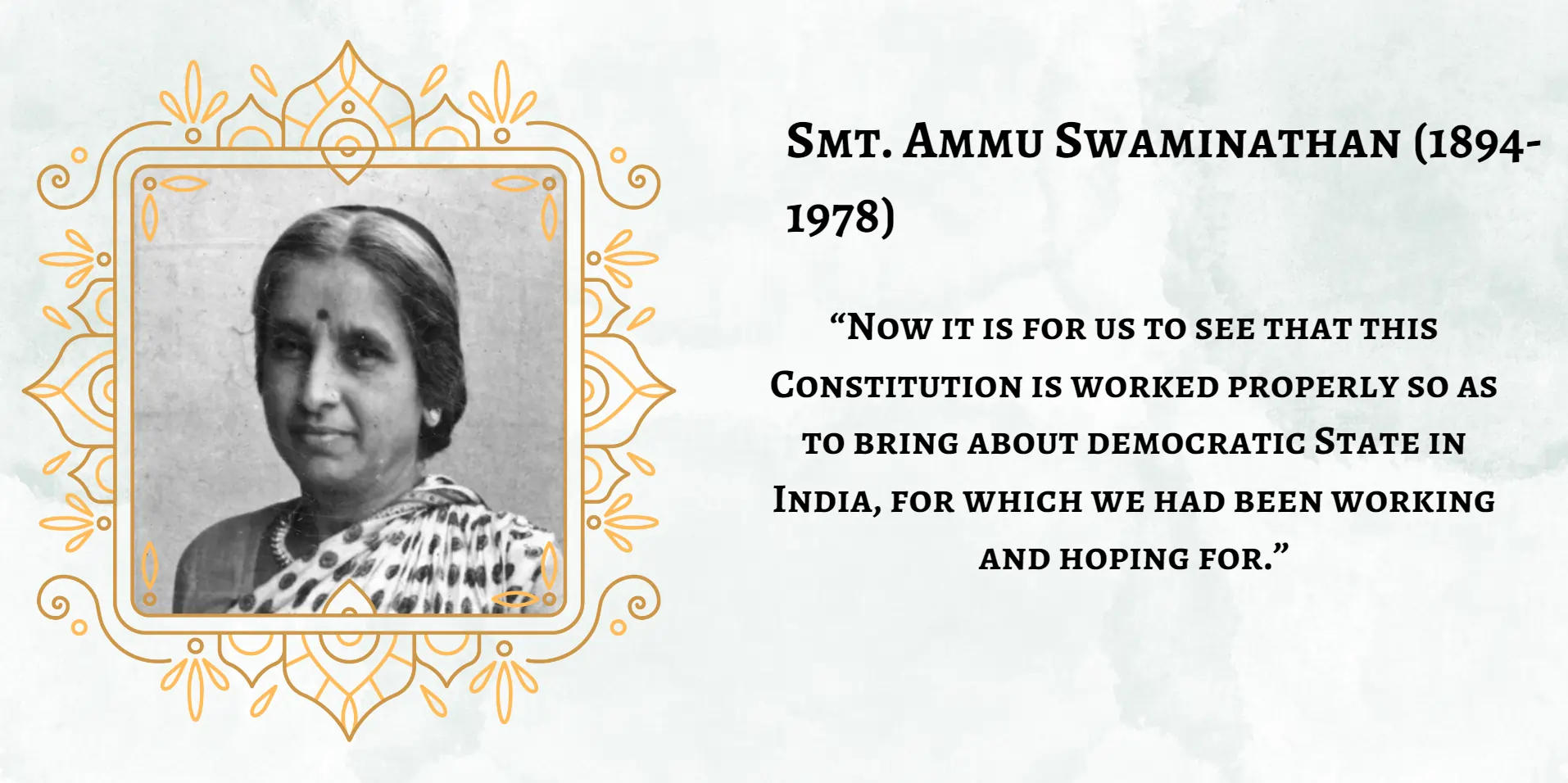
The first Indian woman to become a member of the Indian legislative assembly Ammu Swaminathan was born in 1894 in Palakkad, Kerala. From a young bride she became a staunch politician and a fighter for social justice, which is very evident in her life.
Early Life and Activism
Ammu Swaminathan was married at a very young age with a much elder man named Subbarama Swaminathan. Nevertheless, she set certain conditions, which would be unthinkable according to the position of women in the society at that time. Her journey from a young bride to a prominent political figure is a testament to her resilience and dedication to social justice.
During 1917, Ammu became a member of the Women’s Indian Association a forum which was started by Kamaladevi Chattopadhyay, Annie Besant and Muthulakshmi Reddy. The WIA grew up as one of the biggest women’s rights organisations of India, dealing with issues like child marriage and the devadasi system. It brought out the social reformist spirit in Ammu and she began her association with Women’s Indian Association.
Part played in Indian Freedom Movement
Ammu Swaminathan was also involved in the struggle for freedom of India. The congress appointed her leader of the no-tax campaign in 1934 and she also attended the Calcutta session of the Indian National Congress in 1942 which led to the Quit India Movement and imprisonment. These experiences helped her to firm her commitment towards the struggle for social justice and equality.
Contribution to the constitution
In 1946 Ammu Swaminathan was elected from the Madras Constituency. During her term in the Assembly, she served in committees dealing with fundamental rights and directive principles and supported women and social rights. She was the most supporting and encouraging in demanding Hindu Code Bill for codification of laws regulating marriage, inheritance, succession etc.
However, more equally due to the patriarchal nature of the Assembly, Ammu did not slack in her work to make women’s needs addressed in the Constitution. She has played an essential part in the formulation of other policies that aimed at enhancing women and gender equity policies in India.
Post-Independence Contributions
On the attainment of Indian’s independence, Ammu Swaminathan remained in the political field to further her political activities. She was a member of the first Lok Sabha in 1952 and later a member of the first Rajya Sabha in 1954. She devoted a lot of time and efforts to politics, and also she was India’s goodwill ambassador to Russia, China and America.
Ammu Swaminathan has not only served politics but she has left a legacy altogether. She was also vice president of the Federation of Film Societies and the Censor Board and the president of the Bharat Scouts and Guides 1960-65. All of her accomplishments in the society are evident of her passion for social justice as well as equality.
Annie Mascarene (1902-1963)
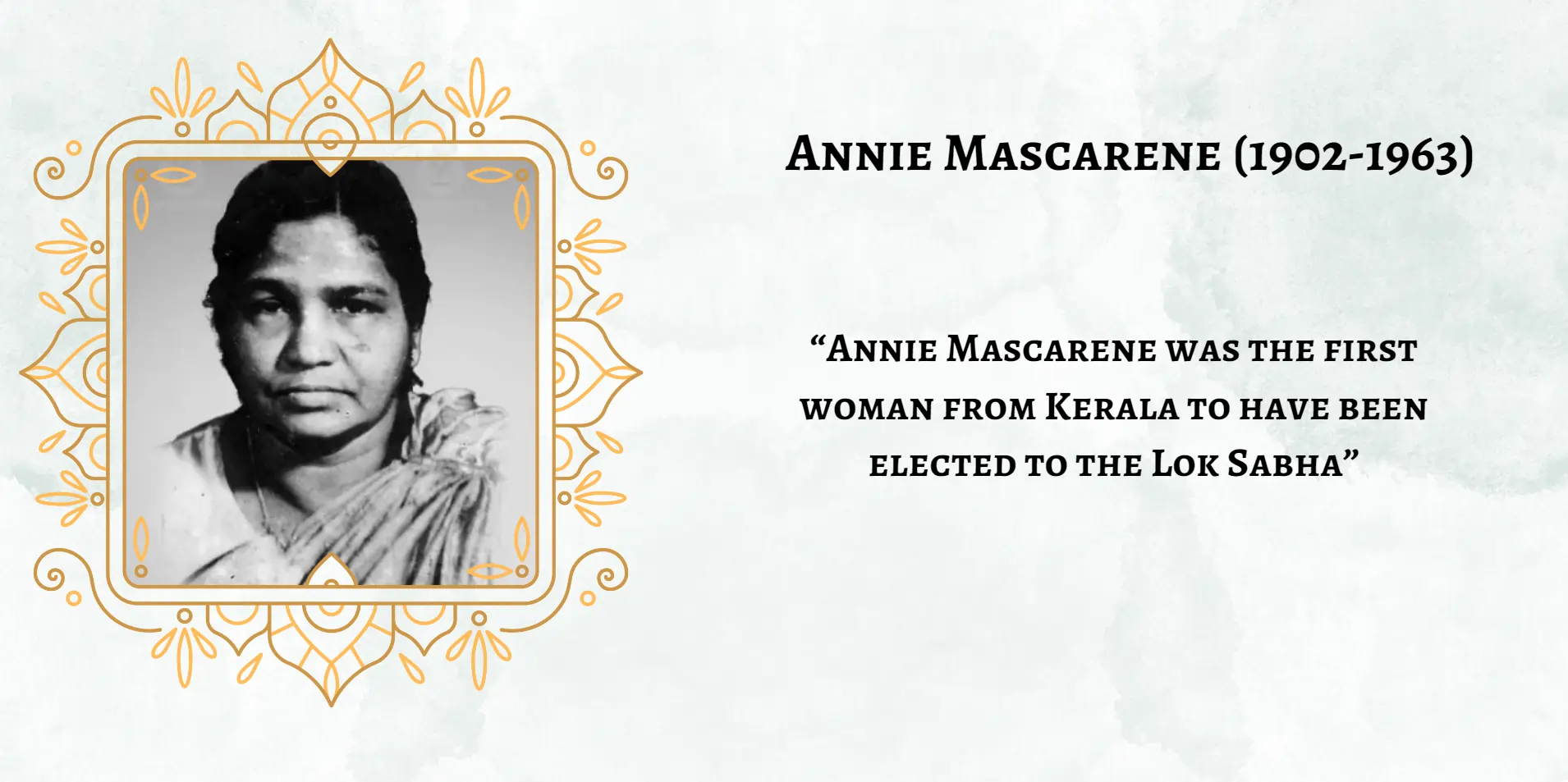
Annie Mascarene, born on 6th June, 1902 in Thiruvananthapuram, Kerala was another women member of the Indian legislative assembly and the most important factor in drafting the Indian Constitution. From a young academic, she rose to one of the reputable political leaders that care for the fates of citizens.
Early Life and Education
Annie Mascarene was the daughter of G.F Mascarene, a Latin Catholic by cast and was a junior government officer for the Travancore state. She continued her studies at the Maharaja’s College, Thiruvananthapuram and passed her examination in double M.A in History and Economics in 1925. She later on did a law degree in Law College, Thiruvananthapuram, after return from Ceylon now Sri Lanka.
Politics and Independence Movement
Strong social and political changes introduced by the royals of Travancore obviously inspired Annie Mascarene. During the disturbance of the political situation she actively participated and joined All Travancore Joint Political Congress which further developed into Travancore State Congress. Mascarene was one of the early women who joined the party and she supported the demand for universal franchise and decentralisation.
However, she met a lot of resistance throughout her activism. Mascarene violated by her political enemies and a police officer attacked her, her home was also burgled. Nevertheless she never surrendered and continued to fight for independence and social justice.
Post-Independence Contribution
After India got its independence, Annie Mascarene also remained engaged in politics. In 1952 she was the first woman from Kerala to become the Member of Parliament through independent ticket from Thiruvananthapuram. During her term in the Lok Sabha, she expressed her concern over the low numbers of women in politics and sought ways and means on how gender parity might be achieved.
Mascarene tried to re-enter in politics, but she could not win the 1957 Lok Sabha seat for the Congress party’s South India constituency; however her effort to enter the political field of India made her a role model for all the women of India.
Begum Qudsia Aizaz Rasul (1909-2001)
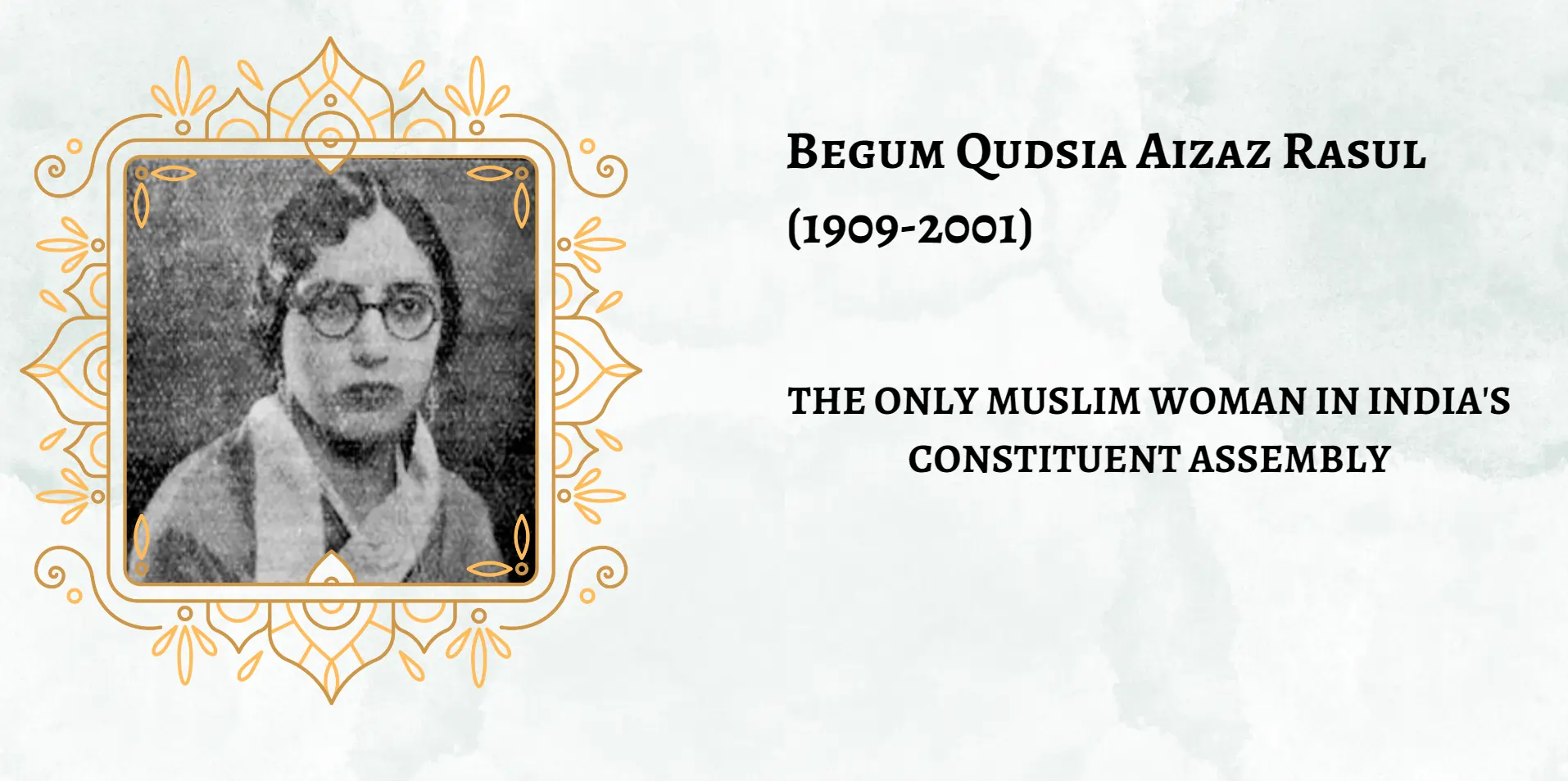
Begum Qudsia Aizaz Rasul was born on second April 1909 in Lahore, Punjab; she was a key administrative woman politician in India and she also served the vital role in making the constitution of Indian republic. Her journey from a young woman in a princely family to a prominent political figure is a testament to her resilience and dedication to social justice.
Early Life and Education
Begum Qudsia Aizaz Rasul has her origin from princely state of Punjab. Her father was Sir Zulfiqar Ali Khan who belonged to royal family of Malerkotla and her mother Mahmuda Sultana was daughter of Nawab Allauddin Ahmed Khan of Loharu. Qudsia had been a schooled woman in her era and received her convent education while the norms of the time were totally against women’s education. It also fundamentally established her contributions to the Indian politics, for her relentless desire to be educated.
Politics and Independent Movement
From childhood, Qudsia was interested in politics to some extent, attending political conventions with her father and often acting as his secretary. In 1937, she was successfully elected as the member of United Provinces Legislative Assembly as one of the firsts who was nominated in a seat. During her term in Assembly she was known for her aggressive stance against Zamindari system and the opposition to separate electorate on religious lines.
Contribution to the Constitution
She was member of Constituent Assembly. She served the United Provinces as a member of the All-India Muslim League in the bill debates on national language, India’s membership in the Commonwealth, reservations, property rights and minorities. These contributions made in these discussions informed the provisions of the constitution with regard to minority rights and the unity of the nation.
Post-Independence Contributions
After the pace India got independence Begum Aizaz Rasul Qudsia again joined politics. She was a member of Rajya Sabha 1952-56 and a member of Uttar Pradesh Legislative Assembly from 1969 to 1989. One of the portfolios she had as a minister in her administration is the minister for social welfare and minorities where she was tasked with the duty of spearheading the process of the economic and social transformation of the minority groups in the country. Such endeavours for the development of woman’s hockey team and being as the president of the Indian Women’s Hockey Federation also made it clear about her concern towards the social causes.
Legacy and Recognition
It is not just the political capital that Begum Qudsia Aizaz Rasul left behind. She also wrote a book “From Purdah to Parliament” which tells about the Muslims women political life in India. In appreciation for her effort, she was honoured with the Padma Bhushan in the year 2000. Her life and work up to this day remain incredible as she advocated for women’s role in the nation-building processes.
Dakshayani Velayudhan (1912-1978)
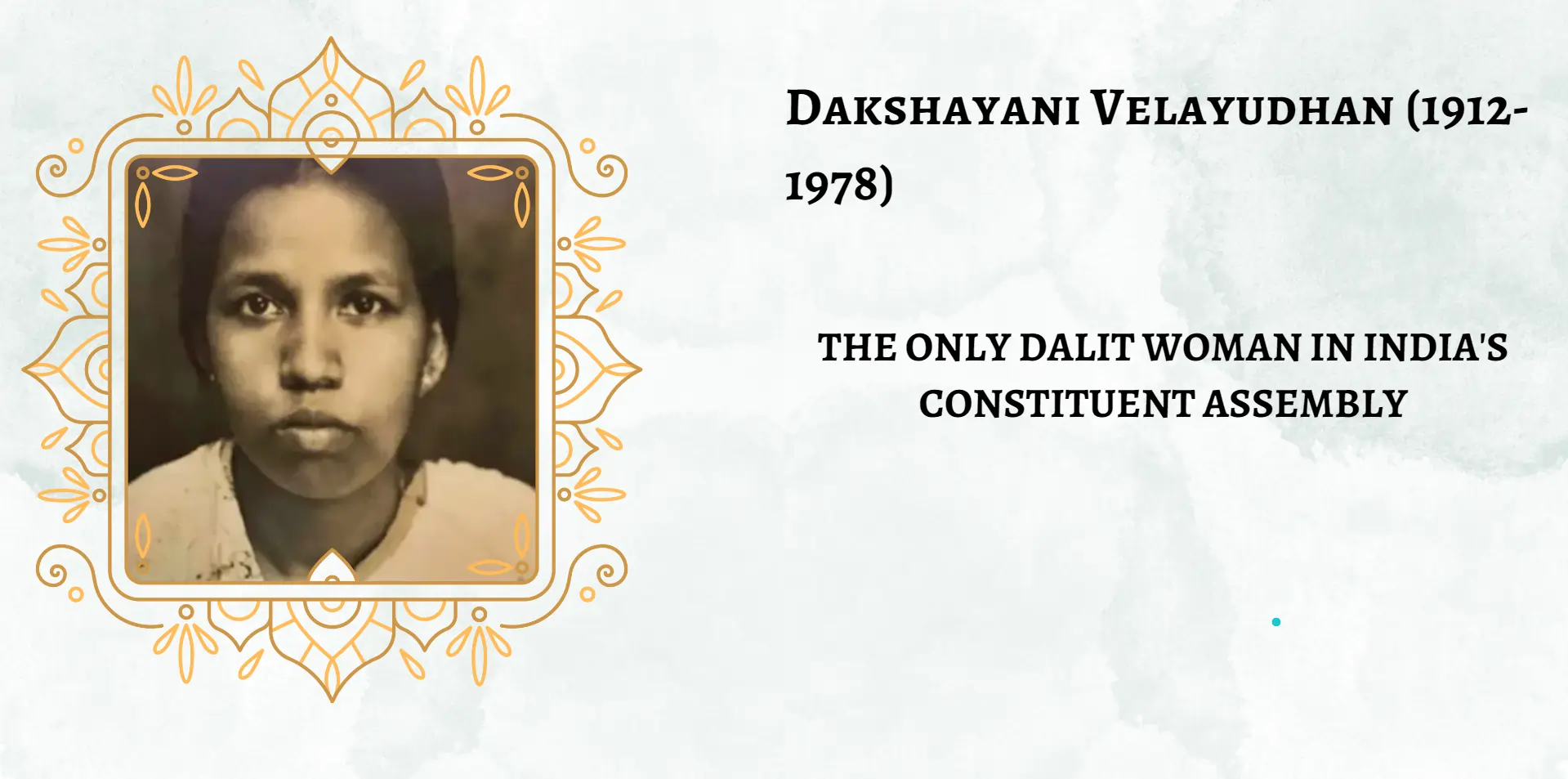
The autobiography of Dakshayani Velayudhan, the woman born on July 4, 1912 in a small village in Kerala, India is rather short, but she was one of the first Dalit women to be part of making of the Indian constitution. Her rise from a poor home to play vibrant role as a member of drafting committee of the Indian Constitution is indeed inspiring and laudable.
Early Life and Education
Dakshayani Velayudhan was born in a Dalit family in Indian society which is categorically discriminated and harassed. Despite all odds, she was determined to continue with her education; socially and economically. She was also the first woman from her community who graduated; she graduated with a Bachelor of Science degree in Chemistry from Maharaja’s College, Ernakulam. Her education played a crucial role in shaping her views on social equality and justice.
Political activism and Leadership
As a political activist Velayudhan started her political career by participating in the struggle against untouchability and caste discrimination. She was actively involved in the Cochin Legislative Council during which she raised her voice for the rights of the untouchables and worked for liberation of their fellow Dalits. Her leadership and activism helped her gain a lot of respect and therefore she was elected to be part of the Constituent Assembly.
Contributions to the Constitution
Her participation in this constitutional framing was, a representation of the intentions of India for Dalits. During the tenure, she was very actively participating in the discussions and debates on issues of justice, equity and minority. Velayudhan personally condemned untouchability and caste discrimination, and demanded for constitutional protection for the Dalits. In her speeches she was seen passionate on issues of social justice and the dream of woman. She demanded the removal of untouchability and the rights of protection the Dalit through constitutional mandates of equality and no discriminations.
Key Contributions
- Advocacy for Social Justice: As far as awareness about social justice was concerned Velayudhan was much committed to it which was reflected in her speeches and interventions in the Constituent Assembly. She also spoke about being a Dalit and appealed to take serious actions against the caste system and discriminate against them.
- Abolition of Untouchability: Among resources, one of the major contributions made by Velayudhan was her fight against untouchability. She urged the framing of Article 15 in the Constitution which prohibits discrimination against any community and grants all equal rights.
- Rights of Marginalized Communities: Velayudhan actively defended the rights of few deprived sections of the society and called for special treatments and legal remediation measures for them. They are the primary reason for carrying forward provisions in operation constitution for the emancipation of Dalits.
- Promotion of Education: Velayudhan indeed was very optimistic about the education and thus, fought for many policies that can help the castes or even the natives to get proper education. Through her vision of an educated and empowered society social provisions of the constitution on education were shaped.
Renuka Ray (1904-1997)
Renuka Ray was born on 4th January 1904 in Calcutta (now Kolkata), was one of the frontline freedom fighters along with being a social reformer and a leading drafter of the Indian Constitution. Her Journey, starting from a young woman from a rich family to a prominent political leader in the Indian political arena, she has achieved her fight for social justice and women eradication.
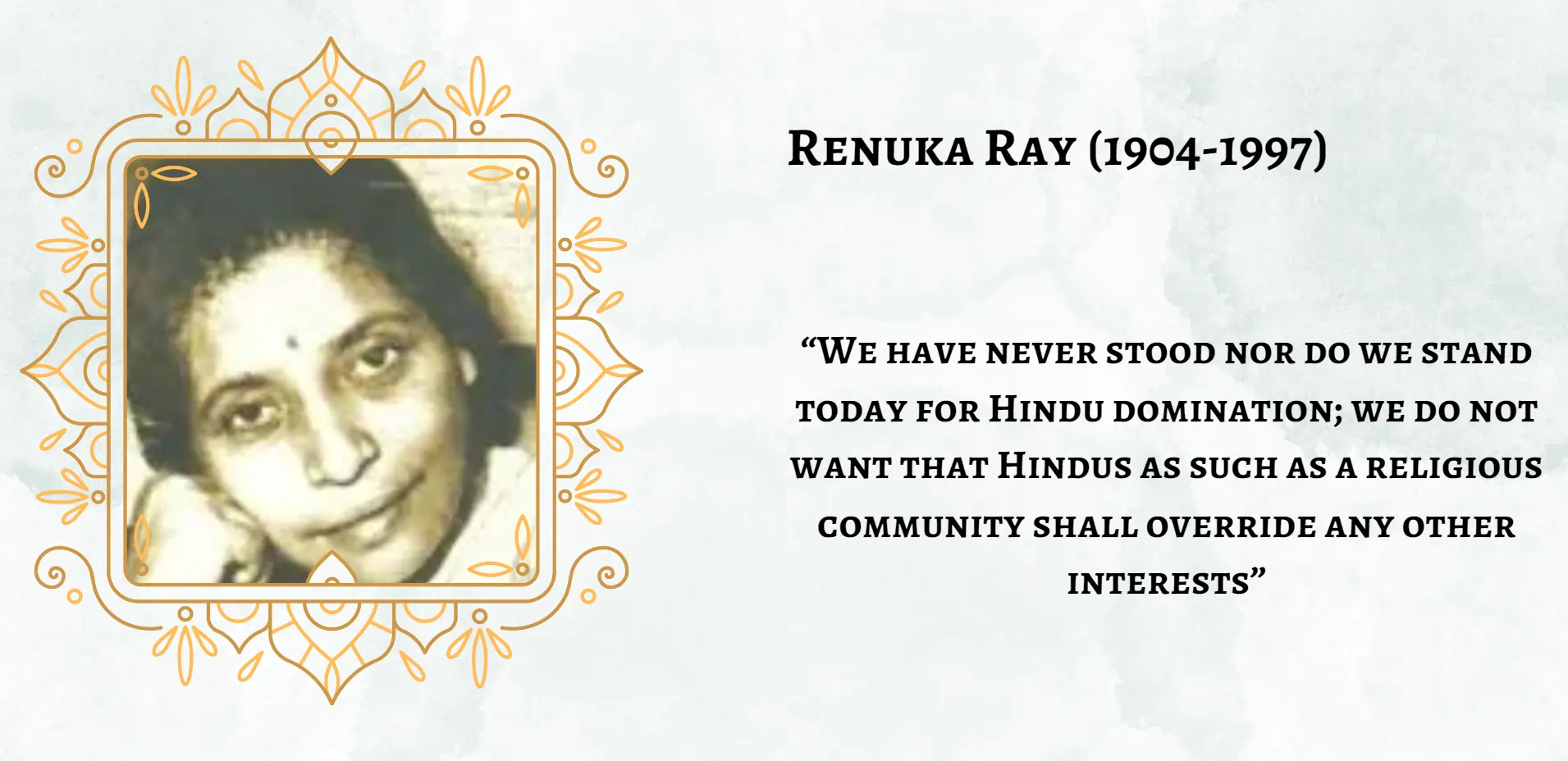
Early Life and Education
She was born to revolutionaries. She was born to Satish Chandra Mukherjee and Charulata Mukherjee. Renuka was educated at the London School of Economics she got inspired with the concepts of social justice and equality. Studying at another country made her to develop a broader perspective of the society and strengthened her passion in reforming it.
Leadership Politics and Social Change
On her return to India, Renuka Ray joined the AIWC in which many great women leaders fought for the cause of women and social reforms. She was also a main spearhead of the campaign against child marriage, dowry, and other vices. She worked hard for the introduction of the bills to change the legal status of women in Indian society.
Contribution to Indian Constitution
She was a member of Constituent Assembly. She was an influential member of the Assembly speaking up for women and the marginalised in the society. She played a very active role in drafting provisions on anti-discrimination, civil liberties, and directive principles of state policy.
Ray was especially very insistent that women be given the same equal rights and opportunities as enshrined in the Constitution. As we can see, she called for provisions covering non-discrimination of women, right to education, employment, and suffrage. She was actively involved in seeing to it that this egalitarian heart value makes an appropriate place into the Constitution on the basis of gender as well as social justice.
Key Contributions
- Advocacy for Women's Rights: The combating spirit of Renuka Ray for women was clearly seen. She stressed on the requirement of women constitutional rights against discrimination now spanning in all aspects of life.
- Social Justice and Equality: Ray was passionate on questions of social justice and, as such, embarked on, a rigorous campaign to ensure that the Constitution called for equality and non-discrimination. She helped place provisions that sought to improve the lives of the less fortunate and any provisions meant of promoting social reform.
- Directive Principles of State Policy: Ray was closely involved in drafting of the directive principles of state policy, which are sort of guidelines for the government in the making of laws and policies. She demanded enshrinement of principles that would improve on social and economic justice for the realization of the welfare of the citizens of the state.
Post-independence contributions
Renuka Ray's contributions to the Indian Constitution and her advocacy for women's rights and social justice have left an indelible mark on India's history. After India gained independence, Renuka Ray continued her political career and was elected to the Lok Sabha in 1952. She had been the Union Minister for Relief and Rehabilitation, where she naturalized over policies related to refugees and displaced persons. Her devotion for social causes did not cease limited to her service in political office but she remained very committed to women issues and social causes through other associations and organizations.